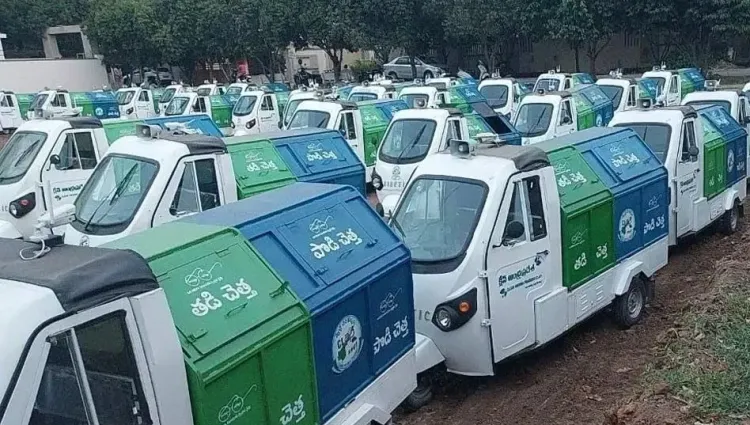How Are EVs Transforming Household Waste Collection Under Swachh Bharat Mission-Urban?

Synopsis
Key Takeaways
- Electric vehicles are transforming urban waste collection.
- They significantly reduce carbon emissions and pollution.
- Initiatives are supported by organizations like UNIDO.
- Employment opportunities are created through these eco-friendly projects.
- Solar charging stations promote renewable energy use.
New Delhi, June 17 (NationPress) The adoption of electric vehicles (EVs) for household waste collection signifies a groundbreaking advancement under the Swachh Bharat Mission-Urban (SBM-U), according to a government announcement on Tuesday.
These zero-emission vehicles embody the future of sustainable urban sanitation—diminishing air and noise pollution while effectively managing daily waste.
By substituting traditional fuel-driven garbage trucks, EVs significantly lower carbon emissions and perfectly align with the mission's objective of achieving garbage-free cities.
“This groundbreaking connection between clean mobility and solid waste management is setting the stage for a more environmentally responsible future,” stated the Ministry of Housing and Urban Affairs.
For instance, Guntur in Andhra Pradesh has embraced an eco-friendly shift in waste management by utilizing over 200 electric autos for door-to-door garbage collection.
This initiative, supported by the United Nations Industrial Development Organization (UNIDO) and the Global Environment Facility (GEF) under the Sustainable Cities Integrated Pilot Approach (SCIAP), replaces traditional diesel-powered trucks with a more sustainable alternative. The electric autos, equipped with GPS tracking for real-time monitoring, efficiently cover the city's 159.46 square kilometers.
“By eliminating the need for over 71,000 liters of diesel each year, this project significantly reduces greenhouse gas emissions—an estimated 21,000 tonnes over a decade—helping to mitigate climate change and improve air quality,” the ministry informed.
The Greater Chennai Corporation (GCC) has also introduced battery-operated electric rickshaws for waste collection throughout the city.
By replacing diesel vehicles with E-rickshaws that can travel approximately 40 kilometers daily, the city effectively minimizes around 41 tonnes of carbon emissions daily—resulting in an annual reduction of 15,160 tonnes.
Currently, the GCC operates a substantial fleet of 5,478 E-rickshaws, servicing all 15 zones and encompassing 24,621 streets and over 2.1 million households.
“This initiative also generates employment for over 6,000 individuals. The integration of audio systems in the E-rickshaws further fosters awareness about waste segregation through dedicated songs and public information campaigns,” stated the ministry.
The Indore Municipal Corporation has made a significant leap toward environmental sustainability and operational efficiency by introducing 100 electric vehicles (e-vehicles) for door-to-door waste collection, replacing traditional diesel-powered trucks.
The transition from diesel vehicles is projected to save the corporation approximately Rs 5.97 crore annually, considering expenses related to fuel, servicing, engine oil, and clutch replacement.
According to the ministry, the corporation has set up 20 solar charging stations, each outfitted with 10 kW solar panels capable of generating 800–1000 units of green energy daily. These stations can charge 80 to 100 vehicles each day, drastically reducing reliance on conventional electricity sources.








